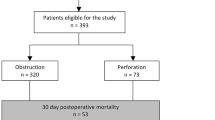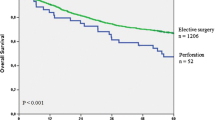Abstract
Background
Emergency treatment of perforated colon cancer has traditionally been linked with dismal outcomes due to the double jeopardy of a septic insult combined with a malignant disease, leaving unclear how aggressive emergency surgical procedures should be. We aimed to define short- and long-term outcomes in the current era of critical care support and oncologic advances, to provide updated data for decision making.
Study Design
Patients with perforations associated with a primary colon cancer were identified. Peri-operative and long-term survival were compared among free (FP; n = 41) and contained perforations (CP; n = 45) and to age-, stage-, and resection status case-matched, non-perforated (NP; n = 85), controls.
Results
Tumors were completely resected in 67% of FP but fewer lymph nodes were harvested (median, 11 vs. 11 and 16 in CP and NP; p = 0.21 and p < 0.001). Peri-operative mortality was highest in FP: 19% vs. 0% and 5% in CP and NP (p = 0.038), respectively. After adjusting for peri-operative mortality, 5-year overall survival was comparable: 55%, 59%, and 54% for FP, CP, and NP, respectively. Advanced age, higher ASA class, presence of residual disease, and advanced stage, but not perforation, were independent predictors of poorer long-term overall survival.
Conclusions
Patients with malignant colonic perforation face high risk of peri-operative death, making septic source control the priority in the acute setting. Pursuit of an oncologically oriented resection and long-term cancer-directed treatments, however, may lead to improved long-term outcomes.


Similar content being viewed by others
References
Edwards, BK, Ward, E, Kohler, BA, et al. Annual report to the nation on the status of cancer, 1975–2006, featuring colorectal cancer trends and impact of interventions (risk factors, screening, and treatment) to reduce future rates. Cancer. 116:544–573,2010.
The United States Center for Disease Control.
Gunnarsson H, Holm T, Ekholm A, et al. Emergency presentation of colon cancer is most frequent during summer. Colorectal Dis. 13:663–668,2010
Bass G, Fleming C, Conneely J, et al. Emergency first presentation of colorectal cancer predicts significantly poorer outcomes: a review of 356 consecutive Irish patients. Dis Colon Rectum. 52:678–684,2009.
Smothers L, Hynan L, Fleming J, et al. Emergency surgery for colon carcinoma. Dis Colon Rectum. 46:24–30,2003.
Runkel NS, Hinz U, Lehnert T, et al. Improved outcome after emergency surgery for cancer of the large intestine. Br J Surg. 85:1260–1265,1998.
Kelley WE Jr., Brown PW, Lawrence W, Jr., et al. Penetrating, obstructing, and perforating carcinomas of the colon and rectum. Arch Surg. 116:381–384,1981.
Cheung HY, Chung CC, Tsang WW, et al. Endolaparoscopic approach vs conventional open surgery in the treatment of obstructing left-sided colon cancer: a randomized controlled trial. Arch Surg. 144:1127–1132,2009.
Lim JF, Tang CL, Seow-Choen F, et al. Prospective, randomized trial comparing intraoperative colonic irrigation with manual decompression only for obstructed left-sided colorectal cancer. Dis Colon Rectum. 48:205–209,2005.
Breitenstein S, Rickenbacher A, Berdajs D, et al. Systematic evaluation of surgical strategies for acute malignant left-sided colonic obstruction. Br J Surg. 94:1451–1460,2007.
Tilney HS, Lovegrove RE, Purkayastha S, et al. Comparison of colonic stenting and open surgery for malignant large bowel obstruction. Surg Endosc. 21:225–233,2007.
Welch JP, Donaldson GA. Perforative carcinoma of colon and rectum. Ann Surg. 180:734–740,1974.
Murphy JE, Ryan DP. American Society of Clinical Oncology 2010 colorectal update. Expert Rev Anticancer Ther. 2010 Sep;10(9):1371–3.
Dellinger RP, Levy MM for the International Surviving Sepsis Campaign Guidelines Committee. Surviving Sepsis Campaign: International guidelines for management of severe sepsis and septic shock: 2008. Intensive Care Med (2008) 34:17–60.
Gunderson LL, Jessup JM, Sargent DJ, et al. Revised TN categorization for colon cancer based on national survival outcomes data. J Clin Oncol. 28:264–271,2010.
Badia JM, Sitges-Serra A, Pla J, et al. Perforation of colonic neoplasms. A review of 36 cases. Int J Colorectal Dis. 2:187–189,1987
Chen HS, Sheen-Chen SM. Obstruction and perforation in colorectal adenocarcinoma: an analysis of prognosis and current trends. Surgery. 127:370–376,2000.
Biondo S, Kreisler E, Millan M, et al. Differences in patient postoperative and long-term outcomes between obstructive and perforated colonic cancer. Am J Surg. 195:427–432,2008.
Abdelrazeq AS, Scott N, Thorn C, et al. The impact of spontaneous tumour perforation on outcome following colon cancer surgery. Colorectal Dis. 10:775–780,2008.
Anwar MA, D’Souza F, Coulter R, et al. Outcome of acutely perforated colorectal cancers: experience of a single district general hospital. Surg Oncol. 15:91–96,2006.
Khan S, Pawlak SE, Eggenberger JC, et al. Acute colonic perforation associated with colorectal cancer. Am Surg. 67:261–264,2001.
Mandava N, Kumar S, Pizzi WF, et al. Perforated colorectal carcinomas. Am J Surg. 172:236–238,1996.
Kriwanek S, Armbruster C, Dittrich K, et al. Perforated colorectal cancer. Dis Colon Rectum. 39:1409–1414,1996.
Lee IK, Sung NY, Lee YS, et al. The survival rate and prognostic factors in 26 perforated colorectal cancer patients. Int J Colorectal Dis. 22:467–473,2007.
Wong SK, Jalaludin BB, Morgan MJ, et al. Tumor pathology and long-term survival in emergency colorectal cancer. Dis Colon Rectum. 51:223–230,2008.
Tan KK, Hong CC, Zhang J, et al. Surgery for perforated colorectal malignancy in an Asian population: an institution’s experience over 5 years. Int J Colorectal Dis. 25:989–995,2010.
Cuffy M, Abir F, Audisio RA, et al. Colorectal cancer presenting as surgical emergencies. Surg Oncol. 13:149–157,2004.
Carraro PG, Segala M, Orlotti C, et al. Outcome of large-bowel perforation in patients with colorectal cancer. Dis Colon Rectum. 41:1421–1426,1998.
Jestin P, Nilsson J, Heurgren M, Påhlman L, Glimelius B, Gunnarsson U. Emergency surgery for colonic cancer in a defined population. Br J Surg. 2005 Jan;92(1):94–100.
Lehnert T, Buhl K, Dueck M, Hinz U, Herfarth C. Two-stage radical gastrectomy for perforated gastric cancer. Eur J Surgical Oncology 2000; 26: 780–784
Crowder VH, Cohn I. Perforation in cancer of the colon and rectum. Dis Colon Rectum. 10:415–420,1967.
Author information
Authors and Affiliations
Corresponding author
Rights and permissions
About this article
Cite this article
Zielinski, M.D., Merchea, A., Heller, S.F. et al. Emergency Management of Perforated Colon Cancers: How Aggressive Should We Be?. J Gastrointest Surg 15, 2232–2238 (2011). https://doi.org/10.1007/s11605-011-1674-8
Received:
Accepted:
Published:
Issue Date:
DOI: https://doi.org/10.1007/s11605-011-1674-8




